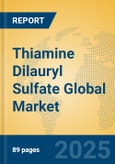The compound demonstrates superior antimicrobial activity against food spoilage organisms including bacteria, yeasts, and molds, while maintaining nutritional vitamin B1 functionality. Unlike natural vitamin B1 which lacks antimicrobial properties, thiamine dilauryl sulfate provides both nutritional supplementation and food preservation capabilities. The industry serves specialized food applications including margarine, mayonnaise, noodles, and various processed foods where both nutritional fortification and antimicrobial protection are required.
Market Size and Growth Forecast
The global thiamine dilauryl sulfate market is projected to reach 45-65 million USD by 2025, with an estimated compound annual growth rate (CAGR) of 5.5%-7.5% through 2030. This growth trajectory is supported by increasing demand for multifunctional food additives, growing processed food consumption, expanding food preservation requirements, and rising consumer awareness of nutritional fortification benefits.Regional Analysis
Asia Pacific leads the thiamine dilauryl sulfate market with estimated growth rates of 6.5%-8.0%, primarily driven by significant food processing industries in Japan and South Korea where the compound has regulatory approval. Japan represents a major consumption market due to advanced food technology applications and regulatory acceptance for food preservation uses. South Korea demonstrates growing adoption in processed food applications, while China shows emerging potential in specialized food additive markets.North America exhibits growth rates of 5.2%-6.5%, led by the United States where specialized food applications and nutritional supplement markets drive demand. The region benefits from advanced food technology research and growing consumer demand for multifunctional food ingredients.
Europe shows growth rates of 4.8%-5.8%, with focus on food safety applications and regulatory compliance requirements. The region emphasizes high-quality food additives and specialized nutritional ingredients for premium food applications.
South America demonstrates growth potential of 4.5%-5.5%, driven by expanding food processing industries and growing consumer awareness of nutritional fortification benefits. The region shows increasing adoption of advanced food preservation technologies.
The Middle East and Africa region exhibits growth rates of 4.2%-5.0%, influenced by developing food processing capabilities and growing demand for food preservation solutions in challenging climate conditions.
Application Analysis
Food Application: This segment dominates with projected growth of 6.0%-7.5%, driven by expanding processed food consumption, increasing food preservation requirements, and growing demand for multifunctional food additives. The segment benefits from rising consumer demand for convenient foods, extending shelf-life requirements, and nutritional fortification trends. Key applications include margarine, mayonnaise, noodles, and various emulsified food products requiring both nutritional and preservative benefits.Pharmaceutical Application: Expected to grow at 5.5%-6.8%, this segment encompasses specialized pharmaceutical formulations requiring vitamin B1 supplementation with additional functional properties. Growth drivers include expanding pharmaceutical production, increasing vitamin supplementation demand, and growing recognition of specialized vitamin derivatives for targeted applications.
Key Market Players
Samin Chemical Co. Ltd.: This specialized chemical manufacturer focuses on high-quality vitamin derivatives and food additives, serving both domestic and international markets through advanced synthesis capabilities and comprehensive quality control systems.Xingrui Industry: The chemical company maintains production capabilities for specialized food additives and pharmaceutical intermediates, offering technical expertise and custom manufacturing services for thiamine derivatives.
Puripharm Co. Ltd.: This pharmaceutical and food ingredient manufacturer specializes in high-purity vitamin compounds and derivatives, serving global markets through advanced production technologies and regulatory compliance expertise.
Industry Value Chain Analysis
The thiamine dilauryl sulfate industry value chain encompasses specialized organic synthesis, advanced purification technologies, and stringent quality control processes. Upstream operations involve procurement of thiamine precursors and lauryl sulfate intermediates requiring pharmaceutical-grade specifications and consistent quality standards.Manufacturing utilizes complex synthesis processes involving esterification reactions, advanced purification techniques, and comprehensive analytical testing. Production facilities require specialized equipment, precise process control, clean room environments, and extensive quality assurance systems meeting both food and pharmaceutical grade requirements.
Distribution channels include specialized chemical distributors, food additive suppliers, and pharmaceutical ingredient companies serving targeted market segments. Technical service providers offer formulation support, regulatory assistance, and application development services for food and pharmaceutical manufacturers.
End applications encompass processed food manufacturing, nutritional supplement production, and specialized pharmaceutical formulations. Professional technical support ensures optimal product performance, regulatory compliance, and effective application across diverse food and pharmaceutical systems.
Market Opportunities and Challenges
Opportunities
- Functional Food Growth: Expanding functional food markets create opportunities for multifunctional ingredients combining nutritional and preservative benefits. Growing consumer awareness of health benefits drives demand for innovative food additives.
- Regulatory Expansion: Potential regulatory approval in additional markets could significantly expand market opportunities. Growing recognition of specialized vitamin derivatives creates possibilities for broader application acceptance.
- Food Safety Enhancement: Increasing global food safety requirements create opportunities for effective antimicrobial food additives with nutritional benefits.
Challenges
- Limited Regulatory Approval: Restricted regulatory acceptance in many markets limits global market expansion opportunities. Complex approval processes for novel food additives create market access barriers.
- Specialized Applications: Narrow application scope limits market size and growth potential compared to broader food additive categories.
- Cost Considerations: Higher production costs compared to conventional preservatives may limit adoption in cost-sensitive food applications.
This product will be delivered within 1-3 business days.
Table of Contents
Companies Mentioned
- Samin Chemical Co. Ltd..
- Xingrui Industry
- Puripharm Co. Ltd.








